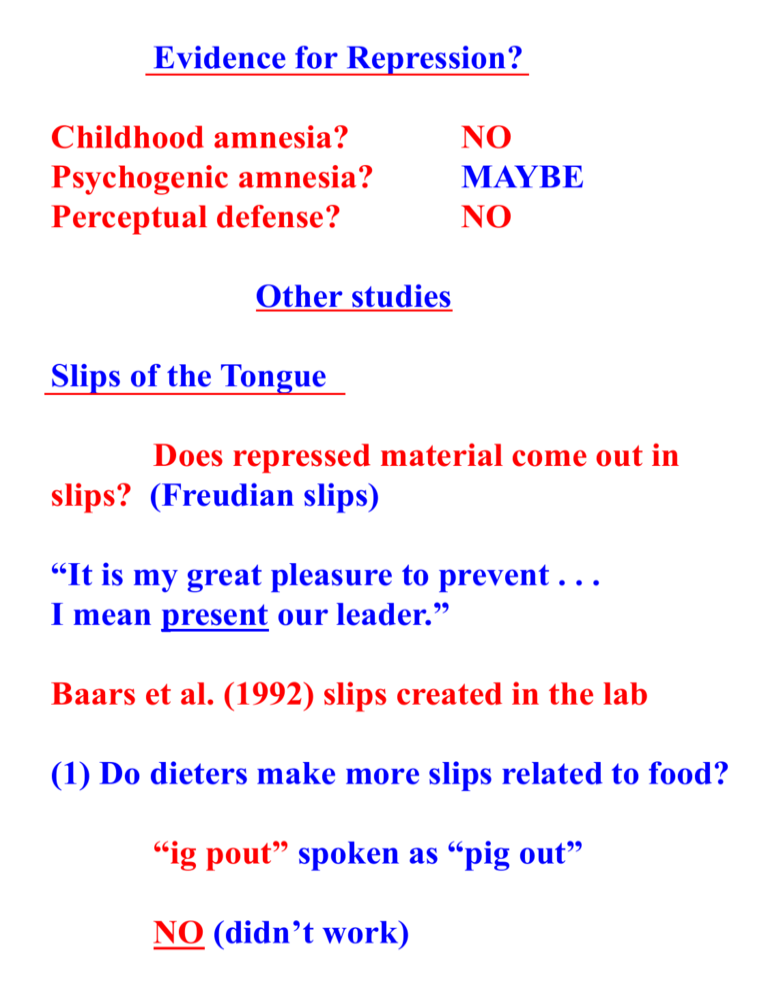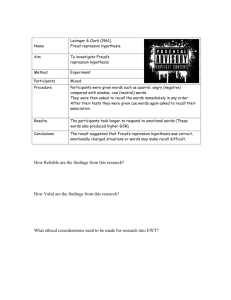Unit3-B-new-Psy248
advertisement

Evidence for Repression? Childhood amnesia? Psychogenic amnesia? Perceptual defense? NO MAYBE NO Other studies Slips of the Tongue Does repressed material come out in slips? (Freudian slips) “It is my great pleasure to prevent . . . I mean present our leader.” Baars et al. (1992) slips created in the lab (1) Do dieters make more slips related to food? “ig pout” spoken as “pig out” NO (didn’t work) (2) Do male speakers who score high on a “sex-guilt” questionnaire make more slips related to sex? “bine foddy” spoken as “fine body” There was a tendency for more slips from the subjects who felt guilty about sex Studies of Collections of Real Speech Errors No evidence for hypothesis that slips express repressed material Conclude: Evidence is not strong for “Freudian slips” Dreams and Repression Why do some people remember dreams more than others? Some people dream less? probably not Some people wake up differently? probably this does account for some difference Repression Hypothesis You repress your dreams and so you only remember “harmless” ones. Salience Hypothesis What matters is intensity. If you don’t remember dreams, it’s because they are not intense. Cohen & Cox (1975) found •A “repression” test did not correlate with dream recall •more intense dreams more likely to be reported Remembering Dreams Are dreams “real”? •REM - rapid eye movements period of REM sleep is correlated with the length of dream content of sleep talking consistent with reported content •Lucid dreaming becoming aware that you are dreaming while you are dreaming You can be trained to make an overt response as soon as you’re aware you are dreaming. Return of Repressed Memories? Painful Memory ... Memory is Gone ... Memory Returns Example return of memory for a murder Are the memories real? False memories can be created by suggestions, misleading information Loftus & Coan “Shopping Mall Experiment” How easy is it to plant false memories in children? “Sam Stone” experiment Ceci, Leichtman & White 3-6 year olds (1) told about Sam Stone who is clumsy (2) “Sam” visits and is not clumsy (3) next day, shown a ripped book and asked if Sam did it •almost no one said Sam did •25% said he could have done it, though, but they didn’t see him do it (4) each child is interviewed 5 times over the next 10 weeks During interviews “I wonder whether Sam Stone was wearing long or short pants when he ripped the book? (6) New interviewer asked children what happened when Sam visited •72% of 3-4 year olds said Sam ruined something •45% “saw” him do it •only 11% of 5-6 year olds “saw” him do it A control group who wasn’t told Sam was clumsy in phase (1) made fewer false claims Conclude: Repeated interviews create false memories more in younger children •Expectations matter Repression •“Everyday repression” •Taboo word effect •Psychogenic amnesia •Slips of the tongue •Return of repressed memories •Childhood amnesia •Poor dream recall lots of evidence not repression repression is possible explanation not caused by repression, but one study (Motley & Baars) does suggest it can happen possible, but memories may be false not repression no evidence for repression Sleep and Memory Jenkins & Dallenbach (1924) % recall of syllables 100% | 1 | | 2 4 retention interval (hours) Why? •Less interference? •Time of day effect? •Maybe sleep actually improves memory | 8 Folkard & Monk (1978) Subjects read 1500-word passage Then answer questions morning is best 115Score on 100questions evening is worst 85- | 8 morning | 11 | 2 | 5 time of day | 8 | 11 Benson & Feinberg (1975) morning afternoon Group A learn 8 hours nonsense syllables Group B learn nonsense syllables .... morning test 24 hours SLEEP Group B is better! Sleep enhances memory? or time of test? test Idzikowski (1984 serial anticipation learning NID GAK LIG FES PAF TUD KEL BOJ Idzikowski Experiment Conditions Subjects are re-tested and % savings is computed Group 1 2 3 4 5 6 7 learn test morning afternoon (8 hours) morning evening (16 hours) morning morning (24 hours) morning morning (24 hours with SLEEP) evening morning (8 hours with SLEEP) evening afternoon (16 hours with SLEEP) evening evening (24 hours with SLEEP) % savings Idzikowski Experiment Conditions Subjects are re-tested and % savings is computed Group 1 2 3 4 5 6 7 learn test morning afternoon (8 hours) morning evening (16 hours) % savings 65% 73% morning morning (24 hours) morning morning (24 hours with SLEEP) 68% evening morning (8 hours with SLEEP) evening afternoon 87% (16 hours with SLEEP) evening evening (24 hours with SLEEP) 86% 84% 84% Idzikowski - Experiment2 Does sleep enhance memory or does being sleep deprived hurt memory? learn test % saving 1. evening SLEEP … SLEEP (33 hours) morning 83% 2. evening SLEEP … all nighter... (33 hours) morning 84% The important thing is to sleep after learning. Being sleep deprived doesn’t hurt as long as you slept after the learning. •Which phases of sleep are important? possibly REM sleep •Are dreams necessary for memory? possibly •Is dreaming a kind of house cleaning of your mind? Context Dependence Your ability to remember an event is better if the “context” at encoding matches the “context” at time of retrieval. Word contexts Fisher & Craik study item damp - LAMP context test damp - ? damp is a better retrieval cue for LAMP than light is Environmental Contexts Material learned in one place is best recalled in the same place. •Room effects are very weak •Godden & Baddeley (1925) Recall while Dry Wet Learn while Dry Wet 13.5 8.6 8.4 11.4 Number of words recalled Drug-related State-dependent Retrieval Material learned under a particular drugged state is best retrieved in the same state. A complete state-dependence experiment Group Learning State Testing State 1 Placebo Placebo 2 Drug Drug 3 Placebo Drug 4 Drug Placebo Drug-related State-dependent Retrieval Material learned under a particular drugged state is best retrieved in the same state. A complete state-dependence experiment Group Learning State Testing State 1 Placebo Placebo good performance shows state-dependence 2 Drug Drug 3 Placebo Drug 4 Drug Placebo Drugs showing state dependence Marijuana (THC) barbiturates amphetamines alcohol Dosage must be high enough to change perceived state of consciousness. Eich et al. (1975) Effect of cues on state dependence Drug was THC (marijuana) Four groups of subjects Test Drug Drug Placebo same diff. diff. same Study Placebo Study categorized lists Furniture … Animals … LAMP LION SOFA BEAR . . . . TEST Free Recall Found large effect of state dependence Cued Recall (give category names as cues) Found no effect of state dependence!! WHY? When do you get State Dependence? Eich (1980) examined 57 studies Type of test State Dependence Free Recall Serial Recall yes yes Cued Recall Recognition no no You get S.D. when memory is tested by a method with no cues Why are Cues Important? 1. Changing the state changes your “inner” context. 2. Context provides cues that guide the initial search through memory. 3. When context is different (when drug state is different) the search is in the wrong place. 4. Cued recall - explicit cues help search get to the right place. Recognition tests - very little search is required. So you get no state dependence with cued recall and recognition. Moods are like internal states Bower (1981) 8070- 60- learn when sad 50| Sad | Happy Recall State Are these phenomena all due to state dependence or environmental context dependence? Failure to Recall Dreams? could be state dependence Hypnotic Amnesia? probably not state dependence alone Failure to Recall Memories From Mania States in Manic-Depressive Psychosis? probably is very similar to drugrelated state dependence Getting Older The bad news •you slow down •you have trouble searching LTS The good news •you know a lot more Memory and Aging •More difficulty with LTS than STS Young Free Recall Old Serial Position Teacher Recall •Remote childhood memories don’t get easier to retrieve with age (Schonfield, 1969) .7.6.5.4| 20-29 | 30-39 | 40-49 Age | 50-59 | 60-69 | 70+ Search phase, rather than the decision phase, of retrieval is disrupted with age. 1. Schonfield & Robertson (1966) 20Recognition more search needed 15- | 20-29 2. | 30-39 | 40-49 | 50-59 | 60+ Vocabulary tests “Hemoglobin means what?” NO DECLINE WITH AGE “Red pigment in blood that takes up oxygen is called what?” GETS WORSE WITH AGE more search needed Processing Speed Sternberg Memory Scanning Paradigm Recognition Test 7 Study yes trial 3 9 7 set size = 3 no trial 2 1 3 4 5 520Each additional item in set adds about 35 msec to RT 490RT 460430400| 1 | 2 | 3 Set Size | 4 | 5 9 1 5 1 5 6 2 8 3 7 5 9 6 Main Results 1. RT increases linearly with set size 2. “Slope” of line is the same for yes and no responses (each additional item adds about 35 msec to RT) Interpretation Items are held in STS •Test item is compared with items in memory one at a time (serial, not parallel, comparison) •The comparison is done exhaustively (all items) not in a self terminating fashion 600 – RT yes 500 – College Students 35 msec/item 400 – | 1 | 2 Set Size | 3 | 4 If selfterminating RT slope for “no” twice as big as for “yes” Set Size If exhaustive RT slope for “no” = slope for “yes” Set Size Data shows that it’s exhaustive 600 – RT yes 500 – College Students 35 msec/item 400 – | 1 | 2 Set Size | 3 | 4 Memory scanning rate is not slower, but overall RT is (could be perceptual or motor processes) 600 – RT yes 500 – College Students 35 msec/item 400 – | 1 | 2 Set Size | 3 | 4 800 – Retardation from brain damage 111 msec/item Mentally Retarded adults (no brain damage) 66 msec/item 700 – 600 – RT yes 500 – College Students 35 msec/item 400 – | 1 | 2 Set Size | 3 | 4 Burke et al. (1991) Old subjects have more Tip-of-the-Tongue experiences. “What is the proper name for a tidal wave?” “Oh … wait! I know … It’s … ... on the tip of my tongue” Number of TOTs in a diary study 7- Number of TOTs in a month 65- 43- young middle old Experimental Study Asked about famous people “What is the last name of the man who said “I regret that I have but one life lose for my country?” 4- Mean # of TOTs 321Young Old Supports the idea that old subjects have difficulty retrieving information from LTS Where do TOTs come from? Connections in LTS (semantic memory) Concepts pigment blood iron hemoglobin Words Sounds h e m o g l o ….. You are in the TOT state when you have activated the word node, but not the sound nodes Why are there more TOTs as you get older? Connections in the LTS network get weaker, so activation spreads more slowly. (Burke et al.) Knowledge is still there, but it is weakened. Hence it sometimes can’t be retrieved. Conclusions 1. Aging affects the search phase of retrieval from LTS •Recall is bad; not recognition •TOTs increase 2. General processing speed is slower The slow processing speed may be the cause of the search deficit





